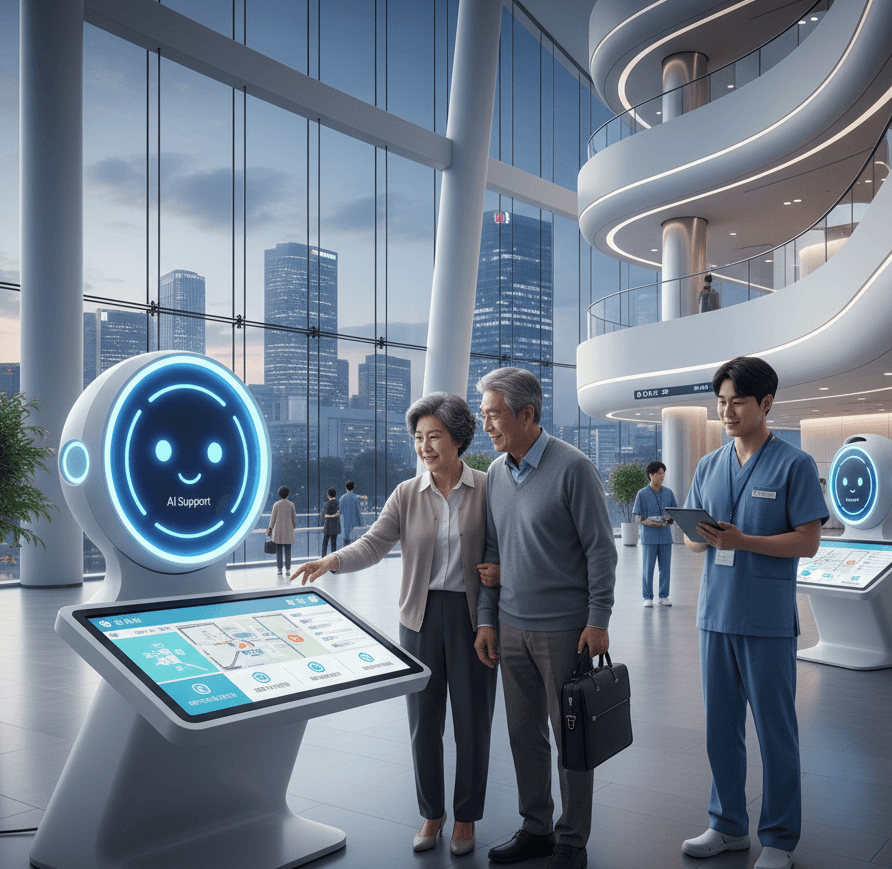South Korea is known for leading the world in technological innovation — from robotics and 5G to smart healthcare. In recent years, one of the most transformative changes in Korean hospitals has been the rise of AI-powered chatbots. These intelligent digital assistants are revolutionizing how patients interact with healthcare systems, making support faster, more personalized, and more efficient. As hospitals aim to balance human empathy with digital convenience, AI chatbots are becoming the new front line of patient communication in Korea.
The Rise of AI in Korean Healthcare
Korea’s healthcare system is highly digitalized, with electronic records, telemedicine, and AI diagnostics already in use. The introduction of AI chatbots takes this one step further — transforming how patients access information and medical support.
➡️ Reasons behind the chatbot revolution:
• Increasing patient demand for 24/7 access to healthcare information.
• Overworked hospital staff needing automated administrative support.
• Government push for smart healthcare and digital transformation.
• Rising comfort with AI tools among Korean citizens.
✅ Insight: Korean hospitals are integrating chatbots not just as information tools, but as intelligent assistants capable of managing appointments, answering questions, and even supporting diagnosis and post-care follow-ups.
How AI Chatbots Work in Hospitals
AI chatbots in Korean hospitals use natural language processing (NLP) and machine learning to understand and respond to patient queries in real time. They are connected to hospital databases, appointment systems, and electronic health records, providing accurate, instant information.
➡️ Core functions of hospital AI chatbots:
• Appointment management: Book, reschedule, or cancel visits through chat.
• Symptom screening: Offer preliminary assessments using AI-driven questionnaires.
• Patient guidance: Direct visitors to departments, doctors, or facilities.
• Medication reminders: Help patients manage prescriptions and schedules.
• Insurance and billing assistance: Explain coverage, payments, and claims.
• Post-treatment care: Provide recovery tips and follow-up notifications.
💡 Result: Patients can access medical support anytime, without long wait times or confusing phone menus — improving satisfaction and hospital efficiency.
Leading Hospitals Using AI Chatbots
Several major hospitals in Korea have adopted AI chatbot systems as part of their digital health innovation programs.
➡️ Examples of implementation:
• Seoul National University Hospital (SNUH): Developed an AI chatbot that helps patients find doctors, book appointments, and check test results.
• Asan Medical Center: Uses chatbot technology to assist in patient registration, reduce call-center workload, and provide health education.
• Samsung Medical Center: Integrated AI chatbots into its mobile app, guiding patients from booking to payment with multilingual support.
• Yonsei Severance Hospital: Offers a chatbot that manages pre-visit instructions and sends reminders for check-ups.
✅ Impact: These hospitals report faster communication times, reduced administrative pressure, and improved patient engagement — particularly among younger, tech-savvy users.
Chatbots Supporting Patient Navigation
Hospital systems can be complex, especially for first-time visitors or non-Korean speakers. AI chatbots act as virtual guides, providing clear, step-by-step assistance.
➡️ Chatbot navigation features:
• Directs patients to specific departments or diagnostic centers.
• Provides hospital maps and estimated wait times.
• Sends push notifications for appointment updates or lab results.
• Offers real-time translation for foreign patients.
🧭 Benefit: This not only enhances accessibility but also reduces stress for patients unfamiliar with hospital systems.
Multilingual and Cross-Cultural Assistance
Korea’s growing popularity as a medical tourism hub has driven hospitals to adopt multilingual AI chatbots. These bots help international patients overcome language barriers and navigate the healthcare process smoothly.
➡️ Multilingual support capabilities:
• Translate between Korean, English, Chinese, Japanese, and more.
• Provide cultural context for treatments and recovery practices.
• Connect foreign patients with interpreters or specialized staff when needed.
• Offer detailed explanations of medical procedures and billing in the patient’s language.
🌏 Global impact: Korean hospitals are now among the most accessible in Asia for international patients, thanks to AI chatbots that simplify every interaction.
Personalized Care Through Data Integration
Modern Korean chatbots are integrated with hospital databases, enabling personalized, data-driven interactions. The AI can recall a patient’s history, previous visits, and medical preferences to deliver tailored information.
➡️ Personalization features:
• Custom reminders for medication or check-ups.
• Recommendations based on health records and lifestyle factors.
• Integration with wearable health devices for real-time monitoring.
• Personalized wellness tips or rehabilitation exercises.
💬 Example: A diabetic patient’s chatbot can remind them to monitor blood sugar, schedule routine tests, and send educational materials about diet and exercise.
✅ Result: The chatbot becomes a virtual health companion, not just a digital tool.
Improving Efficiency for Medical Staff
AI chatbots don’t replace medical professionals — they support them. By handling repetitive and time-consuming administrative tasks, chatbots allow doctors and nurses to focus on patient care.
➡️ Operational benefits:
• Reduces call-center volume and administrative workload.
• Automates appointment scheduling and document processing.
• Provides quick access to patient FAQs, saving staff time.
• Streamlines communication between departments.
⚙️ Outcome: Hospitals report improved workflow efficiency and shorter response times for both patients and staff.
Chatbots in Emergency and Post-Care Support
Some Korean hospitals are exploring the use of AI chatbots for emergency triage and post-treatment follow-ups.
➡️ Emergency functions:
• Guides patients through first-aid steps before arrival.
• Helps identify severity of symptoms and direct them to the right care level.
• Alerts hospitals about incoming cases for faster preparation.
➡️ Post-care features:
• Sends reminders for follow-up visits and medication.
• Checks in on patient recovery and symptom progression.
• Gathers feedback on hospital experience for quality improvement.
🚑 Advantage: Chatbots bridge the gap between hospital and home care, ensuring continuity of support even after discharge.
Integration with AI Diagnostics and Telemedicine
Korean hospitals are combining chatbot technology with AI diagnostic tools and telemedicine platforms, creating an all-in-one healthcare ecosystem.
➡️ Synergy of AI technologies:
• Chatbots collect symptom data before teleconsultations.
• AI analyzes input to suggest possible conditions or next steps.
• Doctors review chatbot-collected data for more accurate consultations.
• Remote monitoring allows chronic patients to stay connected with hospitals.
🩺 Impact: This integration streamlines patient journeys — from initial symptoms to consultation and follow-up — while maintaining accuracy and security.
Data Privacy and Ethical Considerations
Korea takes data security seriously. Hospitals implementing AI chatbots must comply with the Personal Information Protection Act (PIPA) and other healthcare data regulations.
➡️ Key privacy measures:
• End-to-end encryption of all patient conversations.
• Consent-based data sharing with clear usage transparency.
• Regular AI audits to prevent algorithmic bias.
• Use of anonymized data for analytics and research.
🔐 Result: Patients benefit from high-tech convenience without compromising privacy or trust.
Challenges and Future Prospects
Despite their success, chatbot systems still face challenges in emotional intelligence and accuracy. Understanding complex medical nuances or sensitive emotions requires continuous AI training.
➡️ Current challenges:
• Limited empathy compared to human staff.
• Difficulty handling complex, multi-symptom cases.
• Need for integration across different hospital systems.
• Ongoing maintenance and AI model updates.
✅ Future direction: Korean hospitals and tech companies are working on next-generation chatbots that combine emotion recognition, voice-based AI, and deeper learning models to simulate genuine empathy and improve medical advice accuracy.
The Future of Patient Support in Korea
The next phase of healthcare in Korea is human-AI collaboration. Chatbots will evolve into intelligent health companions — guiding patients, supporting doctors, and improving accessibility for everyone.
➡️ Expected innovations ahead:
• Voice-based AI assistants that communicate naturally like humans.
• Predictive analytics for early disease detection.
• Integration with national health data systems for seamless care coordination.
• Wearable and IoT connectivity for continuous patient monitoring.
🌿 Vision: A hospital experience where AI handles logistics and data while humans focus on compassion and care.
Final Thoughts
AI chatbots are transforming Korean hospitals into smart healthcare ecosystems that prioritize accessibility, personalization, and efficiency. They bridge the gap between patients and medical professionals, offering constant support, reliable information, and faster service.
By combining advanced AI, data security, and patient-centered design, Korea is proving that the future of healthcare communication is intelligent, interactive, and deeply human at its core.
✨ In Korea, AI chatbots aren’t replacing doctors — they’re empowering patients and making care more connected, compassionate, and convenient than ever before.













